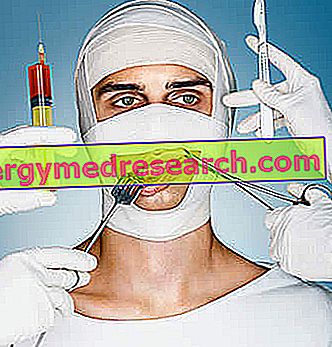Definition
The term "abscess" refers to an accumulation of purulent exudate (or pus), which is collected in a pocket of the skin: the mass of bacteria, plasma, cellular debris and white blood cells generates an inflammation of the damaged tissue, often accompanied by lysis of the same. Some abscesses are completely asymptomatic and harmless (eg yellow-tipped pimples), others are dangerous and painful (just think of the dental abscess).
Causes
Among the causes predisposing to abscess, poor personal hygiene is certainly among the main ones; sometimes, however, even in the case of a thorough personal hygiene, the abscesses are formed anyway: in similar situations, the cause is most probably the parasitic infestation or the penetration of foreign bodies into the skin. Tuberculosis is the risk factor most involved in the formation of chronic abscesses.
- Risk factors: tartar accumulation (periodontal abscess), chronic intake of corticosteroids, AIDS, chemotherapy, diabetes, leukemia, severe burns
Symptoms
The abscess manifests itself as a swollen mass reddened on the surface of the skin; the abscess, with the passage of time, modulates its own consistency, becoming solid and modifying its shape. Often, by crushing the abscess, the pus may come out, with a yellowish / whitish color and an often unpleasant smell. In the event of gravity, the dental abscess creates pain in the teeth, fever, hypersensitivity to chewing and swollen lymph nodes in the neck.
Information on the Abscesses - Drugs for the treatment of abscesses is not intended to replace the direct relationship between health professional and patient. Always consult your doctor and / or specialist before taking Ascesso - Drugs for the treatment of abscesses.
drugs
Although extremely tempting, the outbreak of yellow pimples (which, let us remember, are abscesses) is banned, certainly not because it is painful, but rather to prevent the infection from spreading to the deeper tissues, causing greater damage. For these harmless forms of abscesses, it is recommended to apply warm compresses to the skin, several times a day, letting these take their course.
Different discourse must be addressed for severe abscesses, such as those to the teeth or those that go deep into the skin. First of all, once again, the importance of proper dental and body hygiene must be emphasized to prevent abscesses; in spite of this, sometimes sensitive patients - especially those with alterations of the immune system - even though they practice perfect hygiene of their body, face abscesses, which can also be serious.
Treatment for abscesses includes, in most cases, the administration of antibiotic drugs to remove the pathogen and, possibly, the surgical incision, performed under local anesthesia, to remove the infected tissue.
In the case of dental abscess, it is sometimes necessary to extract the tooth and proceed with the drainage of the area to remove the infection.
- Amoxicillin (eg Augmentin, Klavux, Velamox): for the treatment of dental abscess, it is recommended to take 2-3 g of drug a day, to be repeated every 8 hours.
- Metronidazole (eg Metronid, Deflamon, Flagyl): for the dosage, it is recommended to respect the indications dictated by the doctor. The drug is often taken intravenously; administration is reserved for severe abscesses. Prolong therapy for 7-21 days, depending on the severity of the condition.
- Doxycycline (eg Doxicicl, Periostat, Miraclin, Bassado): the drug belongs to the pharmacological class of tetracyclines and can be used in therapy for the treatment of abscesses. As an indication, it is advisable to take one 100 mg tablet per day, orally, unless otherwise directed by the doctor.
- Piperacillin sodium (eg Limerik, Picillin, Ecosette): the drug is a semi-synthetic penicillin, with a broad spectrum of action, indicated for bacterial infections in the context of severe abscess. For the dosage: consult a doctor.
- Rokitamycin (eg Rokital, Paidocin): the antibiotic drug belongs to the class of macrolides. As an indication, for the treatment of the abscess, take 1 tablet of 400 mg, twice a day, possibly away from meals. Continue antibiotic therapy for the entire period set by the doctor.
Note: the administration of antibiotics is indicated only when the abscess occurs in a particularly violent way and when it also affects the tissue that surrounds the area involved; in fact, if the infection remains confined to the abscess, treatment with antibiotic drugs may not be necessary. However, for immunocompromised patients the administration of antibiotics for the treatment of abscess is almost always indispensable.
Drugs to lower fever associated with abscess: the administration of paracetamol is indicated in cases of high fever in the context of the abscess. Clearly, the administration of this drug is indicated only for the control of a symptom (alteration of the body temperature) and is not useful in any way for the purpose of healing the underlying disease (abscess).
- Paracetamol or acetaminophen (eg Tachipirina, Efferalgan, Sanipirina): recommended to minimize pain and reduce fever in the context of the abscess. Taken orally in the form of tablets, syrup, effervescent sachets, or suppositories, the drug is generally administered at a dose of 325 - 650 mg every 4-6 hours, for 6-8 consecutive days, to bring down the fever. When the fever, especially if high, persists for a long time, seek medical attention.
Painkillers to control the pain associated with the abscess:
- Ibuprofen (eg. Brufen, Moment, Subitene): for medium-moderate pain in the context of the abscess, it is recommended to take an active dose of 200-400 mg (tablets, effervescent sachets) every 4-6 hours by mouth. hours after meals, as needed. Do not take more than 2.4 grams per day. In cases of very severe pain, intravenous administration of the drug is indicated (eg Pedea).
- Naproxen (eg Aleve, Naprosyn, Prexan, Naprius): it is recommended to take the drug at a dose of 550 mg twice a day (one capsule every 12 hours, unless further indications from the doctor), as needed, for pain control associated with the abscess.



